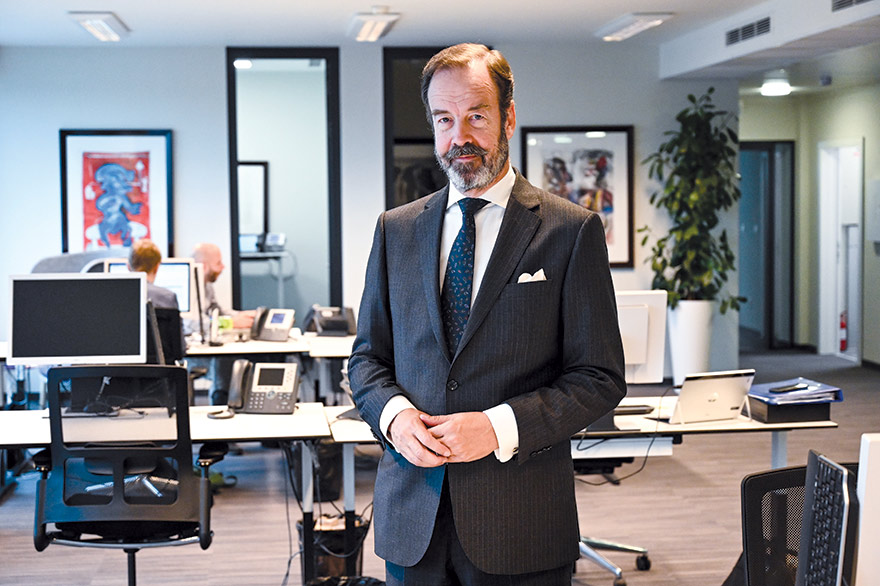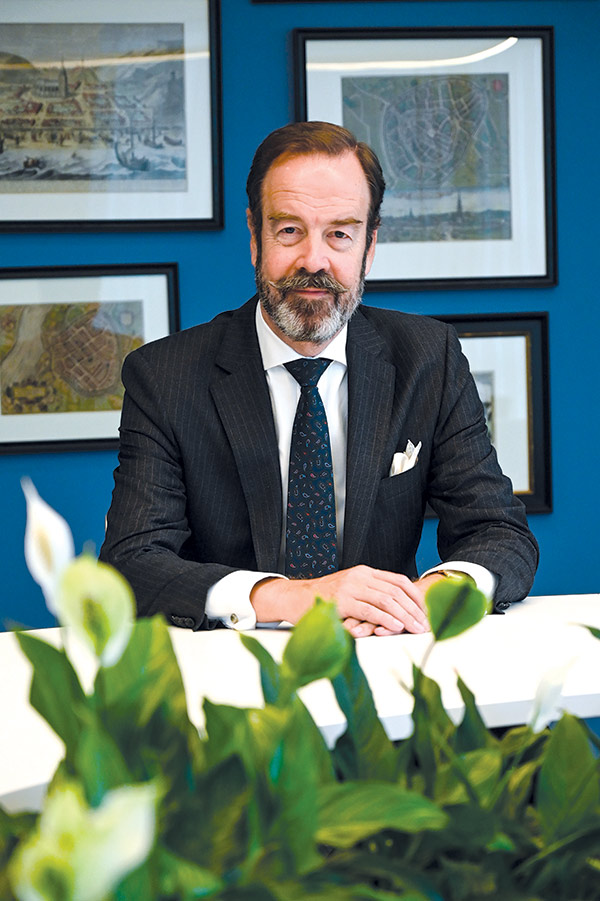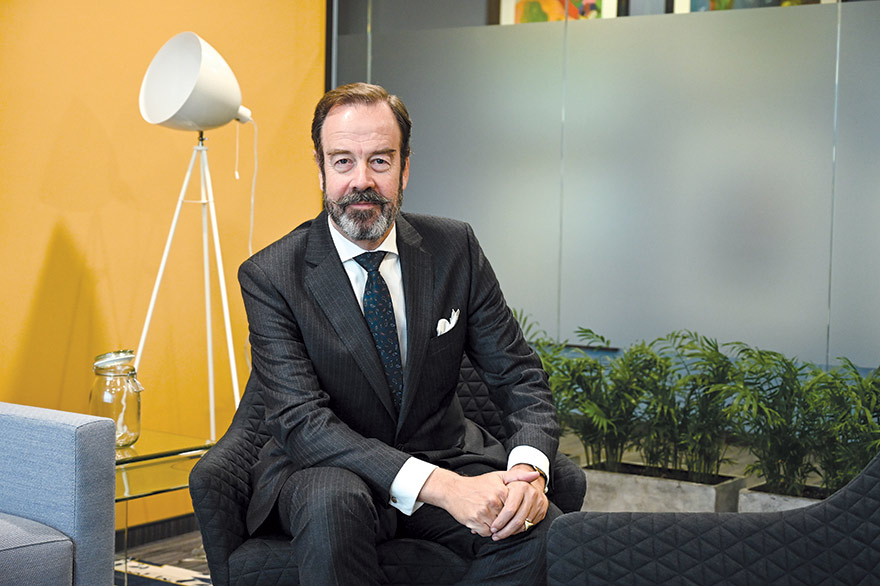Every effort is necessary to ensure elections where parties feel they can participate on an equal footing and all voters can cast their vote freely based on readily available information. The Netherlands welcomes the fact that the European Parliament has stepped forward to mediate and bring the political dialogue forward. We urge both government and members of the opposition to remain involved with the interest of Serbia’s democracy at heart – Ambassador of Netherlands to Serbia H.E. Gilles Arnout Beschoor Plug
The Netherlands supports Serbia’s European integration process and the opening of new negotiation chapters, says Ambassador Gilles Arnout Beschoor Plug. Denying the public perception that the Netherlands belongs to the bloc of EU countries that have the greatest reservations about enlargement, he says that “the Netherlands is a strict, fair and committed partner that judges progress in the accession process on its merits”. In this process, adds CorD Magazine’s interlocutor, it is not only important to adopt laws, rather it is more important to put them into practice, thereby showing genuine adherence to fundamental EU values, such as democracy, judicial independence, freedom of the media or the fight against corruption.
Your Excellency, what could you say about the start and initial period of your term in Serbia?
I have had an intensive start. The Western Balkans are new territory for me and I had to – and still have to – learn a lot. I have the impression that people here are looking forward as much as they look back, and that this is an integral part of one’s identity as well. So a detailed knowledge of history is required – and not only of recent history. Yet everyone I meet is willing to share and to explain, so I feel very welcome.

The Embassy team is wonderful and very experienced, so I rely on them a lot. I haven’t yet travelled much and look forward to exploring the country. Belgrade is a real surprise: a lively, modern, youthful city with a broad cultural agenda.
You arrived in Belgrade from Tel Aviv, where you served as ambassador, so you are a connoisseur of the Middle East. How do you experience this Western Balkan region, which some European officials still see as a potential conflict zone?
I know some experts see a comparison between the Middle East and the Western Balkans. I’m not too sure about that. It is always difficult to compare regions and people. The Middle East is pretty much a region on its own and there is much difference between, for example, the Mediterranean countries and the Gulf states.
On the other hand, the Western Balkans is definitely a part of Europe and the region seems more or less homogeneous. That also means the Balkan countries face more or less identical challenges, be they external – migration for example – or domestic questions like the rule of law: independence of the judiciary, a state structure with effective checks and balances, and freedom of the press. For me, integration into the European Union will provide the best means of countering these challenges and providing a space of peace and prosperity, just as it has done for existing members.
The Netherlands is a strict, fair and committed partner that judges progress in the accession process on its merits. That also means that drafting the right laws alone is not enough. Their implementation is equally important
You have announced that the priority during your term will be furthering Serbia’s accession to the European Union. What would you say to those in Serbia who, following the latest message from European members, like France, believe ever less that there will be a new EU enlargement?
I have often said that Serbia is part of the European family and I will continue to repeat that message. It is important that Serbian citizens know there is a clear path towards EU membership. The Netherlands is a strict, fair and committed partner that judges progress in the accession process on its merits. That also means that drafting the right laws alone is not enough. Their implementation is equally important. There has to be a clear acceptance of the values that the laws aim to protect.
Individual media outlets have reported that the Netherlands is among the countries with plenty of reservations regarding the possibility of Serbia continuing to open new negotiation chapters. Is that true and, if so, what is the reason?

During his recent visit to Serbia, our minister for foreign affairs confirmed that The Netherlands remains committed to Serbia’s EU perspective. We are in favour of opening new negotiation chapters if the necessary conditions have been met. This means that Serbia should be ready to, and capable of, adopt legislation related to a specific chapter, and – more generally – there should be sufficient and sustained progress in strengthening the rule of law. When it comes to Serbia’s path towards EU integration, the Netherlands is not only a critical partner but also a constructive partner that gives strong support.
For example, one of our longest-running assistance programmes is the Netherlands’ Fund for Regional Partnership – MATRA, which we implement in all candidate countries, including Serbia. Projects under this programme are focused on strengthening civil society, democracy and the rule of law.
Since the beginning of the European integration process, Serbia has received messages from the Netherlands that reforms will be monitored with particular attention in the area of the rule of law. How would you evaluate this process to date?
Sustained progress on the rule of law is essential because it reflects a political commitment to the basic principles that unite EU member states and are so much part and parcel of our societies. These are principles like democracy, independence of the judiciary, freedom of the media, the fight against corruption and organised crime etc. These are considered of paramount importance not only by the Netherlands but by all member states – and we seriously keep examining ourselves as well. In fact, there is a completely new initiative in the EU to reinforce the rule of law among present member states.
As to Serbia, there has definitely been some progress in some areas, but there are serious delays and concerns in other areas. Generally speaking, legislation is being enacted but isn’t always fully implemented. Serbia is a frontrunner in the accession process, so our expectations are high and we look forward to the sustained impact of reforms. We always emphasise in particular the importance of freedom of expression – there is no democratic society without the right to form your own opinion and to express it freely. Media freedom is a priority because independent, responsible and pluralistic media are part of the necessary checks and balances in a society. They are crucial to maintaining open and free democracies.
Many of these (Dutch) companies are united in the Dutch-Serbian Business Association, last year’s founding of which was a significant step forward in our economic relationshipa
Do you believe that political dialogue within Serbia, which is being conducted with the help of European parliamentarians, can help create the conditions for free, fair and democratic elections?
Every effort is necessary to ensure elections where parties feel they can participate on an equal footing and all voters can cast their vote freely, based on readily available information. In that light, the Netherlands welcomes the fact that the European Parliament has stepped forward to mediate and bring the political dialogue forward. We urge both the government and members of the opposition to remain involved with the interest of Serbia’s democracy at heart.
According to the statistics of the National Bank of Serbia, the Netherlands has a high ranking when it comes to total investments in the Serbian economy. Do you see opportunities to further expand that cooperation and, if so, in which areas?
I am very proud that Dutch companies and products are part of the economic heartbeat of Serbia and part of the daily lives of its citizens. In fact, they include household names, such as the largest supermarket chain in the country, one of the largest web portals in Serbia and the most popular beer brands in the country. Dutch companies are also active in shipbuilding, IT, consumer goods, public lighting, construction, manufacturing, agriculture, renewable energy, and the list goes on.
Moreover, these are all responsible, modern Dutch employers that invest heavily in their workforce and in the local communities where they work and on which they depend. Many of these companies are united in the Dutch-Serbian Business Association, last year’s founding of which was a significant step forward in our economic relationship. Having said all that, of course, we can always do better and expand further.

We recently organised a trade mission focusing on exploring the enormous potential for cooperation between Serbian and Dutch companies in the soft fruit sector. We are currently working on exploring opportunities for enhanced cooperation in water management, something that the Netherlands was quite literally built on. We are also working on organising a ‘Balkan Business Dialogue’ event in the Netherlands, in order to present the many opportunities of this region to Dutch companies. Several other events and initiatives are in the works for next year, so we are looking forward to an even closer economic relationship with Serbia in 2020!
The Serbian-Dutch Business Forum that was held last spring saw business leaders from the two countries discuss cooperation in the area of the so-called circular economy. The Netherlands has set itself the goal of becoming a circular economy by 2050. What does this mean in practical terms?
We are a small yet densely populated country Our history, culture and economy are built on making the most out of limited resources. By looking ahead, we have been able to overcome many challenges and turn them into advantages. We know that the global economy is growing, but that the planet is not. That means that we need to rethink how our industries work and how we live. In the Netherlands, we have decided to take action sooner rather than later, and adapt to a new reality. The Netherlands is one of the first countries to make a Circular Economy Roadmap, alongside Finland and Slovenia. Five strategies towards a circular economy were presented in January last year covering five key areas – biomass and food, plastics, the manufacturing industry, construction and consumer goods.
We are currently working on exploring opportunities for enhanced cooperation in water management, something that the Netherlands was quite literally built on
However, the transition to a circular economy is not a task for government alone. It requires social transformation. That is why, in the Netherlands, public authorities, companies, knowledge institutions and civil society are working together towards concrete targets – to reduce carbon emissions by 49 per cent by 2030 and to cut raw material use by 50 per cent. It’s an ambitious target, but it’s important to take this challenge head-on and to set an example, as well as to support other countries by exporting our knowledge and expertise. Dutch experts participated in this year’s Mikser Festival in order to share the Dutch experience in this process and assist Serbia in moving towards a similar approach.
Do you believe that environmental issues will become important conditions for the progress of candidate countries, including Serbia, towards EU membership?
They already are. Chapter 27 is a key step in the EU integration process and entails the implementation of EU legislation in the field of environmental protection. That is by no means an easy task. In fact, it is a very challenging one that we in the Netherlands also struggle with. Achieving and maintaining EU environmental standards requires a comprehensive approach, involving businesses, education, government institutions, local governments and significant amounts of investment across a wide range of issues.
It might prove to be one of the most challenging chapters for Serbia and other candidate countries to close. That’s why I’m glad that Serbia now has a Ministry of Environment that can prioritise and implement the work that’s needed to ensure that this beautiful country can protect its phenomenal nature and provide healthy living conditions for all of its citizens and their children.
| MESSAGE
I have often said that Serbia is part of the European family and I will continue to repeat that message |
INVESTMENT
I am very proud that Dutch companies and products are part of the economic heartbeat of Serbia and part of the daily lives of its citizens |
CONDITIONS
We are in favour of opening new negotiation chapters if the necessary conditions have been met |
|---|